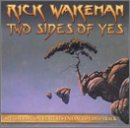Yes... it's musak
Simon Barrow | Exeter, United Kingdom | 06/09/2002
(1 out of 5 stars)
"Rick Wakeman's solo output has been vast in recent years. It has also been perilously devoid of quality control. Yet his work with Yes in the 1970s (particularly on 'Fragile' and 'Close To The Edge') is worthy of considerable respect. Knowing that he will be touring again with the band in 2002 and 2003 I decided to check out 'Two Sides Of Yes', hoping to detect a return to form. I'm sad to report that it is not in evidence on this album.The 'two sides' of the CD title are, respectively, new piano interpretations of Yes material (`Your Move', `Long Distance Runaround', excerpts from `Close To The Edge', and Anderson, Bruford, Wakeman Howe's `The Meeting') intercut with previously released instrumentals (`Wondrous Stories', `Don't Kill The Whale' and `Roundabout'). The latter feature long-term Wakeman collaborators Alan Thompson (bass) and Tony Fernandez (drums). The disc also features a video of `The Meeting' - which only works with Windows 2000 or higher. As my platform is Windows '98 I am unable to view it; and to be frank I am not over-anxious to renegotiate my relationship with the Bill Gates empire just for that privilege.I have always wondered quite why many progressive rock fans are so slavishly devoted to Rick Wakeman and all his doings. When he first emerged as a name the number of proficient musicians in the rock field was pretty small. He acquired a reputation as a virtuoso merely by leaving the Royal College of Music well before his classical mettle would have been tested, and by playing in front of audiences who had mostly never heard anything better. In Yes, however, he was challenged by a group of fractious and inspired musical sparring partners who helped to push his boundaries out. In turn he contributed a fresh approach and set new standards for the use of multi-keyboard arrangements. Less happily he also gained a taste for gratuitous showmanship that impresses a certain kind of impressionable young man at a testosterone-vulnerable age.It is a matter of great regret that for most of his subsequent solo career Wakeman has dwelt more in those areas of weakness and susceptibility than in situations likely to challenge him to move further forward. `Two Sides of Yes' is a good example of this plight. The idea of piano or instrumental versions of classic Yes pieces is a strong one, but Wakeman has realised it with a formulaic, playing-by-numbers style. Outside the arena of unreasoned loyalism towards the man it has to be said that little on this album ascends above the level of musak - and some of it isn't even very good musak. On the piano his approach is well charted: generate some constantly repeated chord shapes with one hand, trill away speedily at the melody with the other. Then add a few embellishments and flourishes for good measure. Occasionally a melodic idea is adapted, in fairly textbook and uninteresting ways. Development would be far too strong a word to describe this. `Close To The Edge' hints at some slightly less usual harmonic patterns, but `Long Distance Runaround' (for instance) is embarrassingly obvious. Wakeman has chops but fails to engage his imagination.The group material is even worse: plodding drumming and rhythm that bleeds any metrical interest out of the original works, competent but unexciting bass accompaniment, and some truly dreadful bargain-basement synth sounds from Wakeman. That is not the fault of the co-musicians; it is simply the result of uninspired arrangement.`Two Sides of Yes' is dire stuff. And it is made all the more sad by the fact that Wakeman's soloing on `Mind Drive' (`Keys To Ascension', volume one, 1996) started to sound much fresher and more interesting - even if his choice of patches raised questions there too. Let's hope he follows the more adventurous path for his future work with Yes. Meanwhile, this CD is definitely not a good introduction to the band or to what Wakeman might be capable of if he decided to push the boat out. But he has always been loath to accept criticism, using the unfairness he has sometimes encountered as a way of deflecting awkward truths. And his small army of uncritical admirers will no doubt defend this latest let-down as they have defended everything he has done, good and bad alike. Time to move on, Rick."
Something old, something new
A. Lesley | Conway, S.C. United States | 03/03/2002
(5 out of 5 stars)
"I guess the "two sides" title is used to describe the 50% electronic keys part of the cd and the 50% piano based part.
Well, if I'm not terribly mistaken, the synth versions here are recycled from the disc 2 of Rick Wakeman's Greatest Hits. However, the piano tracks are new and worth the cost of the cd alone. A piano version of "Close To The Edge" sounds really good. There's also a video track for the computer of "The Meeting"."


 Track Listings (8) - Disc #1
Track Listings (8) - Disc #1